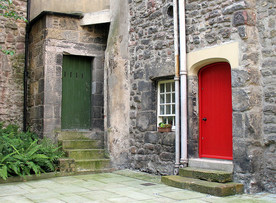 Caroline: What inspired you to put this class together? Cam: The university where I live has a program called OLLI (Osher Lifelong Living Institute), which presents non-credit courses in all sort of disciplines to students over the age of 50. With all the recent interest in “Outlander” and then the independence referendum last September in Scotland, it occurred to me that OLLI might consider a course on the history and culture of Scotland. They accepted my proposal, and I’ve just finished teaching the course. What fun! Caroline: What was exciting to you about this particular subject? What is your connection to it? Cam: I was excited about it because I particularly enjoy teaching just this sort of course, where we examine a subject, in this case Scotland, over time and from many different angles. I find that students enjoy this multi-disciplinary approach too. Growing up, my parents had a beautiful book with a MacRae tartan silk cover, and inside, page after page of photographs of all the men named MacRae who had died in World War I. My sister and I used to pour over those pictures conjuring connections to them. I guess I’ve never lost that sense of being part of a larger Scottish world. Caroline: What do you hope students get out of the class? Cam: I hope they come away from the course with a deeper understanding of how, in general, geology, geography, history, culture, and language are all intertwined, and specifically how this relates to Scotland, then and now. We’ll be talking about Doggerland, Neolithic house building, the Moine thrust fault, Celts, Picts, the Book of Deer, Scottish drove roads, coal mining, “Celtic” music, and I’ll throw a few kings and queens in there too, for good measure. Caroline: In what ways might this class be different from the kind of ‘Celtic’ culture people see at highland games or on Celtic Women? Cam: It will be different because we’ll be talking about Scottish history and culture, not a generic “Celtic” history or culture. In one of the classes we’ll discuss the definition of “Celtic,” ways it can be a useful, clarifying, term, and ways in which it isn’t. Caroline: Do you think this class would give people a better understanding of modern Scottish events such as the independence referendum? Cam: I hope so. I’ve been doing a lot of reading on the politics leading up to the referendum, the issues that were being discussed last summer, and opinions and news since the vote. Elections for the UK Parliament will take place in early May, and by the time we reach that part of the course, we’ll be able to see what effect the independence referendum has had on the outcome. Caroline: How would taking this class be beneficial for someone learning Gaelic? Cam: In the original OLLI course, I referred often to the various languages spoken in Scotland, especially Gaelic, and how it is woven into Scottish history and culture. One of the themes of the course is how the Gaelic language arrived in Scotland, the forces and influences which helped its base of speakers spread and then eventually shrink. Other than that, I think if you’re going to put effort and time into learning a language, that it’s a good idea to have a broad knowledge of the area where it’s spoken. Caroline: Do you think that having an understanding of the history and culture would help Gaelic students understand some elements of the language? Cam: Well, I can’t promise that it will help with learning irregular genitive forms or how the inverted nominal works, but we will talk about Gaelic in its cultural and historic context. I’d like to think that that is an important part of any language student’s knowledge. And of course I’m always happy to talk about the genitive. Caroline: Do you think that knowing about the history and culture might help people understand or relate to some of the idiosyncrasies of Gaelic? Cam: Possibly. Languages don’t develop in a vacuum, so we’ll talk about how and why Scottish Gaelic has developed differently than Irish Gaelic, for instance, and we can also discuss why various Gaelic dialects differ from each other.
0 Comments
Leave a Reply. |
Details
AuthorsCaroline has been involved with Gaelic for more than 18 years. She has degrees in Celtic Studies and Gaelic Medium Teaching. Archives
March 2021
Categories
All
|
Proudly powered by Weebly

 RSS Feed
RSS Feed